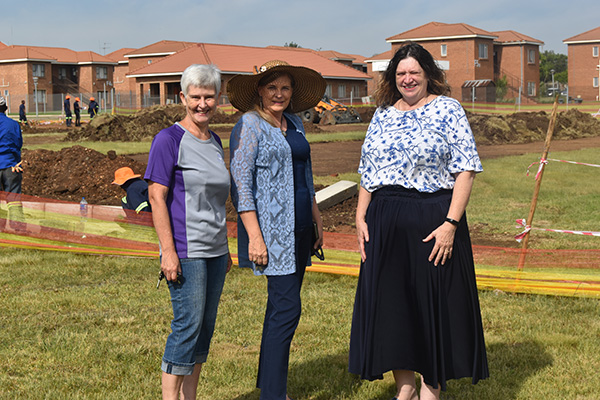The North-West University's (NWU’s) Vanderbijlpark Campus recently launched the HaReJeng (Let Us Eat) Community Engagement Garden project, an innovative plan aimed at promoting sustainable food production, service learning, and community engagement.
Preparation has started on a 40m x 41m rectangular area on campus which will initially host two 3 x 4m “pop-up’’ greenhouses, each containing 32 African Grower towers. These towers are vertical growing systems that consist of growing pods stacked on top of one another. Each tower will have four Shwe-Shwe-covered pots in which four seedlings can be planted.
Prof Kloppers says Dr Elize Küng, deputy dean for community engagement and stakeholder relations in the faculty, sparked the project idea in 2021.
The gardening project is spearheaded by Prof Magda Kloppers and the staff of the School of Mathematics, Science and Technology Education (SMSTE) at the Faculty of Education. They will also work closely with the Thutopapadi project, of which Prof Stef Esterhuizen is the project leader. Thutopapadi focuses on play-based learning, and will involve early childhood education centres (ECEs) in the Sedibeng East education district to implement nature play for sustainable development.
"Through this project we aim to involve all students in the Faculty of Education on the Vanderbijlpark Campus in service learning and community engagement activities. The area will host a vegetable and herb garden, and will also be used to create an outdoor nature play area for visiting children from the community,” explains Prof Kloppers.
"This project will also promote the use of indigenous healing plants, which are a significant part of South African culture and traditional medicine,” she adds.
She says his initiative has the potential to make a significant positive impact on the lives of students, communities, and the environment. “It is a project that deserves support and celebration from all those who care about the future of our planet and communities."
Prof Kloppers says the harvest will be made available to staff, the kitchen on campus, students and the community. “The garden will also be used as a platform to teach students, among others, the components of computational thinking, coding and robotics, as well as skills required in the science, technology, engineering, arts and mathematics. The garden will also be a resource for lecturers in the school and the Early Childhood Development and Education subject group in reaching the outcomes of their modules.
She says their dream is to make this project sustainable for years to come and to positively impact the lives of all members in the community. "We aim to involve parents and grandparents with knowledge of indigenous plants to pass on their expertise to future generations.”
She adds that they need all the support they can get. “We kindly request everyone to support this initiative. Among other things, we need 1 024 seedlings for the 64 African Grower towers, any used kitchen utensils, spades and rakes for visiting children, wooden crates from which kitchen furniture for a “mud-kitchen’’ can be made, binoculars and a water fountain."
Prof Linda du Plessis, the deputy vice-chancellor for planning and Vanderbijlpark Campus operations, says she is very excited about the project. “I believe this project is a significant step towards eradicating poverty, which aligns with the UN's 2030 Agenda for Sustainable Development.”
For more information about the project, please contact Prof Magda Kloppers at 084 583 2521 or Prof Stef Esterhuizen at 076 163 9648.

Prof Magda Kloppers, Prof Linda du Plessis and Dr Elize Küng are excited about the prospects of the HaReJeng garden project.
